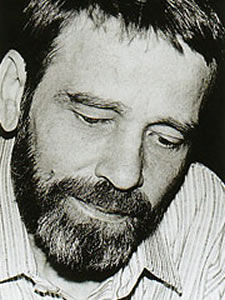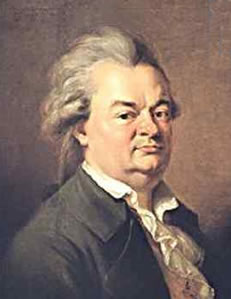De Nederlandse dichter en schrijver Willem van Iependaal werd geboren in Rotterdam op 24 maart 1891. Zie ook mijn blog van 24 maart 2009.
Dikke Dinges R.I.P.
Dikke /dinges was verscheiden,
in zijn Heer en litjemaux,
de professor kwam en zeide:
“Hum, hum, hum….”, en liet het zoo.
Doodkist werd besteld, gemeten
afgebiest met plint en lat
die, met zillever besmeten,
krap , fataal en poenig zat.
Zeven bidders wiegewankten
in d’r grafgezanten vlijt
met de kostbaar ingeplankte
vieze dikke dooigheid.
Van de traphal naar den wagen,
van de wagen naar het graf….
trapten in plechtstatig dragen
voormans hak en hielen af.
Heel de Dingespermentasie
vormden om de kuil een O
dominee hield een predikasie
over Christenheil en zoo
over dood en over leven
zoo kortstondig als het gras
treurend snoten al de neven,
om den duur van het gewas.
Hier ligt in z’n Heer ontslapen
(oogen toe en zonder weet)
de geliefde , zeer rechtschapen
makelaar in kinderleed.
Spekulant in graan en krotten,
zwaar geschut en menschenwee
God zij ziel! …. Het graf z’n botten!
Dikke Dinges R.I.P.

Willem van Iependaal (24 maart 1891 – 23 oktober 1970)
De Duitse dichter Richard Leising werd geboren op 24 maart 1934 in Chemnitz. Zie ook mijn blog van 24 maart 2009.
Hauch
Nun kommt der leichte Wind
Der am Abend kommt
Wovon kommt er wohl
Der am Abend kommt?
Der sich so sacht erhoben hat
Wovon kommt er wohl?
Am Baum bewegt sich jedes Blatt
Davon kommt er wohl

Richard Leising (24 maart 1934 – 20 mei 1997)
De Oostenrijkse dichteres en schrijfster Gabriele von Baumberg werd geboren op 24 maart 1768 in Wenen. Zie ook mijn blog van 24 maart 2009.
Als Luise die Briefe ihres ungetreuen
Liebhabers verbrannte
Erzeugt von heißer Phantasie,
In einer schwärmerischen Stunde
Zur Welt Gebrachte, geht zugrunde,
Ihr Kinder der Melancholie!
Ihr danket Flammen euer Sein,
Ich geb euch nun den Flammen wieder,
Und all die schwärmerischen Lieder,
Denn ach! er sang nicht mir allein!
Ihr brennet nun, und bald, ihr Lieben,
Ist keine Spur von euch mehr hier.
Doch ach! der Mann, der euch geschrieben,
Brennt lange noch vielleicht in mir.

Silhouet
De Duitse dichter, componist enn journalist Christian Friedrich Daniel Schubart werd geboren op 24 maart 1739 in Obersontheim. Zie ook mijn blog van 24 maart 2009.
Das Mutterherz
Mutterherz, o Mutterherz!
Ach! wer senkte diese Regung,
Diese fluthende Bewegung,
Diese Wonne, diesen Schmerz,
Süß und schauervoll in dich!
Gott, der Herzenbilder,
Sprach zur rothen Fluth
In den Adern: Milder
Fließe, still und gut!
Und da strömten Flammen
Alle himmelwärts
In der Brust zusammen,
Und es ward ein Mutterherz.
Mutterherz, o Mutterherz!
Diese liebevolle Regung,
Diese fluthende Bewegung,
Diese Wonne, diesen Schmerz
Senkte Gott, nur Gott in dich!

Christian Schubart (24 maart 1839 – 10 oktober 1791)
De Zuidafrikaanse schrijfster Olive Emilie Albertina Schreiner werd geboren op 24 maart 1855 in Wittebergen, Lesotho. Zie ook mijn blog van 24 maart 2009.
Uit: The Story of an African Farm
„It is a funny name.’
‘There was a living man called Bonaparte once,’ said she of the great eyes.
‘Ah, yes, I know,’ said Em – ’the poor prophet whom the lions ate. I am always so sorry for him.’
Her companion cast a quiet glance upon her.
‘He was the greatest man who ever lived,’ she said, ’the man I like best.’
‘And what did he do?’ asked Em, conscious that she had made a mistake, and that her prophet was not the man.
‘He was one man, only one,’ said her little companion slowly, ‘yet all the people in the world feared him. He was not born great, he was common as we are; yet he was master of the world at last. Once he was only a little child, then he
was a lieutenant, then he was a general, then he was an emperor. When he said a thing to himself he never forgot it. He waited, and waited, and waited, and it came at last.’
‘He must have been very happy,’ said Em.
‘I do not know,’ said Lyndall; ‘but he had what he said he would have, and that is better than being happy. He was their master, and all the people were white with fear of him. They joined together to fight him. He was one and they were many, and they got him down at last. They were like the wild cats when their teeth are fast in a great dog, like cowardly wild cats,’ said the child, ’they would not let him go. They were many; he was only one. They sent him to an island in the sea, a lonely island, and kept him there fast. He was one man, and they were many, and they were terrified of him. It was glorious!’ said the child.
‘And what then?’ said Em.
‘Then he was alone there in that island, with men to watch him always,’ said her companion, slowly and quietly, ‘and in the long, lonely nights he used to lie awake and think of the things he had done in the old days, and the things he would do if they let him go again. In the day when he walked near the shore it seemed to him that the sea all around him was a cold chain about his body pressing him to death.’

Olive Schreiner (24 maart 1855 – 11 december 1920)
De Engelse schrijver, ontwerper en utopisch denker William Morris werd geboren op 24 maart 1834 in Walthamstow, Essex. Zie ook mijn blog van 24 maart 2007 en ook mijn blog van 24 maart 2009.
Uit: Why I Am a Socialist
„Now this view of Socialism which I hold today, and hope to die holding, is what I began with; I had no transitional period, unless you may call such a brief period of political radicalism during which I saw my ideal clear enough, but had no hope of any realisation of it. That came to an end some months before I joined the (then) Democratic Federation, and the meaning of my joining that body was that I had conceived a hope of the realisation of my ideal. If you ask me how much of a hope, or what I thought we Socialists then living and working would accomplish towards it, or when there would be effected any change in the face of society, I must say, I do not know. I can only say that I did not measure my hope, nor the joy that it brought me at the time….
Before the uprising of modern Socialism almost all intelligent people either were, or professed themselves to be, quite contented with the civilisation of this century. Again, almost all of these really were thus contented, and saw nothing to do but to perfect the said civilisation by getting rid of a few ridiculous survivals of the barbarous ages. To be short, this was the Whig frame of mind, natural to the modern prosperous middleclass men, who, in fact, as far as mechanical progress is concerned, have nothing to ask for, if only Socialism would leave them alone to enjoy their plentiful style.“

William Morris (24 maart 1834 – 3 oktober 1896)
